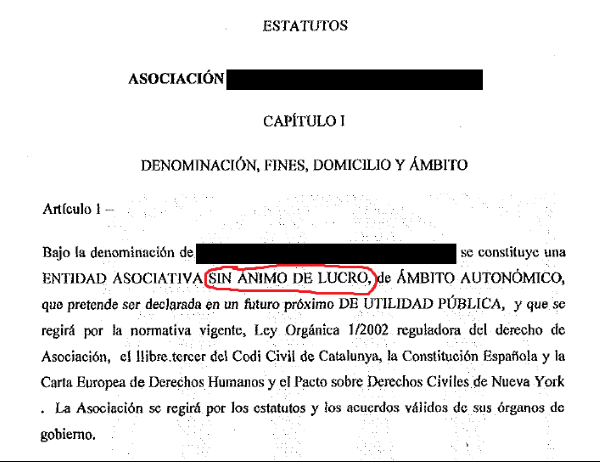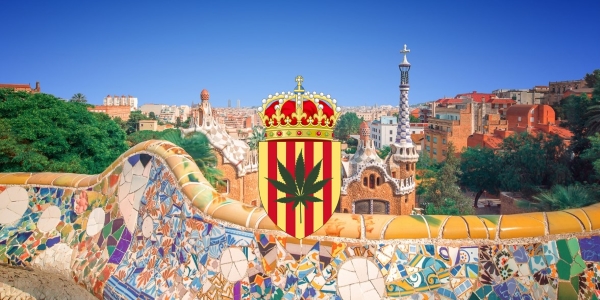Contrary to popular belief, cannabis clubs in Barcelona do NOT exist as a legal loophole. They are bona fide private organizations and associations that operate based on foundational aspects of Spain’s Constitution. Unfortunately, because so many people misunderstand how cannabis clubs in Spain work, the general conception has been that the clubs exist merely as a legal loophole. This simply isn’t true, and my readers should be glad for this because the thing about loopholes is that they can be closed.
Loopholes can be Closed
Let’s be clear about one thing; if cannabis clubs in Barcelona existed only through a legal loophole, then that hole would have been shut years ago. There are strong factions in Catalonia that do not want the clubs to continue to flourish (this is true throughout Spain). Many of these factions are in power and could have easily shut the clubs down if they existed through a legal loophole. To their discredit, those factions have repeatedly tried using other means to kill the clubs off, but their efforts don’t work because the cannabis club system is based on Constitutional law.
Here are the 2 primary foundational principles of cannabis social clubs in Spain – these are the reasons the clubs exist, the reasons why they have not been shut down, and the reasons why these associations will continue to exist long after I give up trying to tell people that it’s not because of “loopholes:”
😉
Constitutional Privacy Protections
Spain has extremely liberal constitutional privacy protections. In summary, what these laws state (among other things) is that what one does is the privacy of one’s home is no one else’s business. This protection covers even the audacious desire of people to grow and use plants such as cannabis.
These privacy laws have been tested in the courts – Spain is a case law nation – and the result has been that if you want to grow a few plants in your home or other private location – out of view of the public – then that’s acceptable. If you want to smoke fat blunts and bongs and hit dabs all day, you can do so in a private place. That’s your right to privacy under Spanish law.
Right to Association
Spain’s constitution also grants its citizens the Right to Association. This means that people are permitted to organize as groups for specific causes or purposes. If you want to start a chess club, you can assert your rights under the constitutional provision of the Right to Association and start a chess club. Or if you are a group of attorneys that want to fight for marijuana legalization, you have the right to create a legal professional association in order to do so. These associations can be for-profit or sin animo lucro – without profit.

To recap, it is permissible under Spain’s privacy laws to cultivate for personal use in a private environment. It is also permissible for groups of people to band together to form and operate an association.
So let’s say that you live in Barcelona and you have a huge apartment. You grow 3-4 of your own cannabis plants and always end up with a surplus that you share with friends. Well let’s say that I approach you and ask if I could share a small space in your garden to grow my own plants; let’s assume that my apartment is small and I don’t know how to grow very well. Now we are two people growing the small amount of cannabis allotted to us under Spanish law, and we are doing so in private.
But now our mutual friends Xavi and Paola want to get involved too, and eventually several others ask to share gardening space. So we all pool our resources together and setup a more professional style grow room in your huge apartment. In order to protect ourselves under the law and to ensure that we follow a strict closed circle doctrine, we choose to hire an attorney to develop our Articles of Association, and we become a private association, sin animo lucro.
BOOM! That’s it; you just witnessed the birth of a cannabis club
Imagine a little further down the line; let’s assume you grow excellent cannabis and more and more people ask to share in your garden. So you take up a collection (member fees; this is not “profit” as all monies collected must be returned to the association) and rent out a larger space and purchase more equipment to accommodate more members.
These are the basic foundational principles of cannabis clubs in Barcelona and most of Spain, although different regions interpret and apply the laws differently. When setup and managed properly, a cannabis association in Spain is a legitimate legal entity with rights and privileges like any other. Cannabis clubs in Spain are based on constitutional privacy rights and the right to association and not on a loophole.
- Barcelona Cannabis Club Review: Green Age - March 23, 2022
- Things to do after Smoking Weed in Barcelona - March 2, 2022
- 9 Things You Need to Know about Cannabis Clubs in Madrid - February 15, 2022



2 thoughts on “Cannabis Clubs in Barcelona: NOT a Legal Loophole”
Nice article mi amigo
Hi, thanks for the post, really informative! I was wondering, is it possible for tourists to visit these clubs? I’ll be in Barcelona next week and would love to visit one!
Thanks in advance
Alex